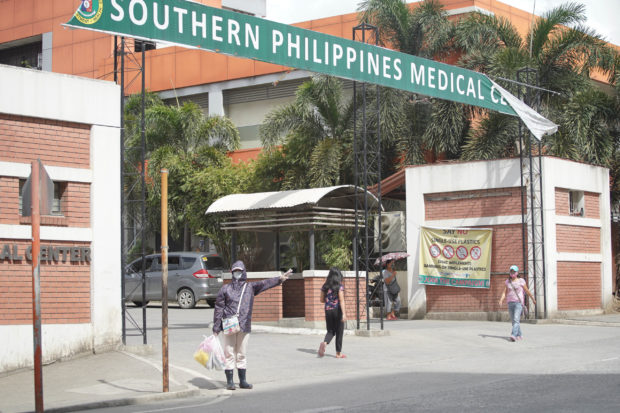
FULL CAPACITY The Davao City-based Southern Philippines Medical Center, the primary hospital in Mindanao handling coronavirus cases, is close to full capacity, warns the local medical community amid the resurgence of COVID-19 infections in the city. —KARLOS MANLUPIG
CEBU CITY, Cebu, Philippines — The cities of Cebu and Davao, the economic powerhouses of the Visayas and Mindanao, will shut its borders anew in the wake of the rising cases of coronavirus disease.
Cebu City will be off-limits to nonessential travels starting at 5:01 a.m. on Monday, Mayor Edgardo Labella posted on Facebook on Saturday.
“We do not want to return to an enhanced community quarantine (ECQ) so we need to be more vigilant while the virus remains,” he said.
In Davao City, Mayor Sara Durterte issued an order asking the Joint Task Force (JTF) COVID Shield to restrict nonessential travel to the city effective 5 a.m. on Tuesday, Nov. 18.
But while Cebu City is trying to avoid reimposing the ECQ, Duterte on Saturday endorsed to the regional Inter-Agency Task Force (IATF) the recommendation of the local medical community to revert the city to ECQ as cases surged in the city.
New infections
Cebu City officials had initially thought they had controlled the spread of the disease until the number of daily cases turned double-digit over the last week. On Saturday alone, there were 59 new infections, bringing to 262 the active cases in the city, according to the Department of Health.
Labella said the city’s borders would be closed for those traveling for leisure and unofficial business while workers, authorized personnel outside residence (Apor), and those with legitimate concerns would be allowed to enter provided they had medical clearances from their local governments.
Duterte, on the other hand, ordered that the movement in Davao City of both Apor and non-Apor be restricted.
Cebu City, however, allowed the entry of workers with proper identification cards and certification of employment in the city, and residents of Cebu City who are working in towns and cities of Cebu province.
Labella said the city police would launch Oplan Paglilibot to ensure that the 11 p.m. to 5 a.m. curfew was strictly followed.
Village officials and watchmen were also instructed to ensure that the minimum health protocols, including the wearing of face masks and face shields, physical distancing and regular disinfection, were being implemented in their areas.
Cebu City was placed on ECQ on June 16 when it became the new epicenter of virus cases after it registered infections higher than those in Metro Manila cities. It took about two months of strict quarantine enforcement before the city was downgraded to modified general community quarantine (MGCQ), the most relaxed form of community quarantine.
STRINGENT SCREENING With the ongoing surge of COVID-19 cases in Davao City, even non-COVID-19 facilities like the Anda RiverviewMedical Center are adopting stringent measures to screen patients. —GERMELINA LACORTE
Overwhelmed
Davao City is also currently under MGCQ. This week, however, the local medical community sounded a distress call to authorities and recommended to place the city under ECQ as the recent surge of COVID-19 cases threatened to overwhelm hospitals.
Duterte said she would let the JTF COVID Shield decide whether or not to revert to ECQ.
Dr. Bernard Chiew, a cardiologist at the Davao Doctors Hospital, said the COVID-19 cases in the city was controlled until last month when new infections rose.
“Almost all villages have been declared high-risk areas. Several outbreaks of [COVID-19 cases] were reported in several institutions, including government offices,” Chiew said in his post.
“SPMC (Southern Philippines Medical Center) is close to full capacity most of the time. Same thing with private hospitals which were started to be opened up for (COVID-19) cases,” he said.
He said isolation centers in the city were now being equipped with double-deck ed beds to accommodate more cases and “contact tracers are overwhelmed trying to track down cases.”

